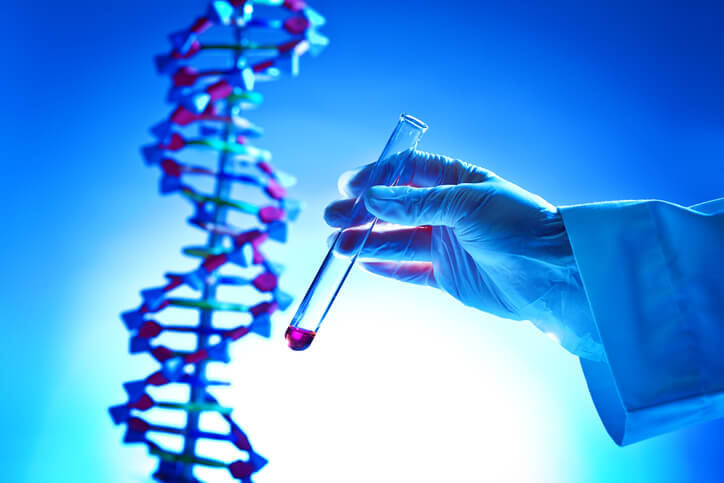Not all gestational surrogacies use embryos made from the gametes of two intended parents. In many cases, a donated sperm or egg cell is needed to create a healthy embryo for transfer. Whether it’s because an intended parent has low-quality sperm or eggs, or because an intended parent is pursuing surrogacy as a single parent, using gamete donations is more common than you might think.
Like many different aspects of assisted reproductive technology, the use of donated gametes can be a complicated one — as it has advanced rapidly within the law few decades. But, there is one modern aspect of using donor gametes to really pay attention to: the rise of DNA- and genetic-testing sites.
Today, anyone can send off their information to a DNA or ancestry site and find previously unknown genetic details. They may even locate biological relatives they had no idea existed.
This is a mind-blowing advancement for modern society but especially so for those using gamete donations in their assisted reproductive technology, including surrogacy. In fact, it’s changing the field in a way never anticipated.
The Move From Anonymous to Identified
Years ago, anonymous sperm and egg donors were common and accepted. Intended parents choosing to have a donor-conceived child received only a small amount of non-identifying medical information to share with their child as they grew up — if they even shared that their child was born via a donor gamete in the first place. Previously, information about donors was kept anonymous and sealed for years, and questions from parents and children went unanswered.
For many reasons, this left a negative impact on children. Their medical history always had the potential to change without them knowing the most recent information. They could never get answers to questions about who they looked like, where their traits came from, and why their biological parent had donated their gametes. Many children suffered identity issues from these situations.
Donor banks have started to recognize these disadvantages. The Sperm Bank of California recently updated its policies to require all sperm donors to participate in a known-donation program, phasing out anonymous sperm donors in 2016. It makes clear that donors are not expected to have a parent-child relationship with someone conceived through their donation — just updated medical and contact information upon the child’s 18th birthday.
American Surrogacy stands with those donor banks in recommending identified donations for all intended parents needing them in gestational surrogacy. Our specialists are always happy to talk with you in more detail about identified and anonymous gamete donation, as well as provide references to trusted identified gamete banks. To learn more, call our surrogacy specialists at 1-800-875-2229(BABY) today.
The Unrealistic Expectations of Being an “Anonymous” Donor
These new advances should be considered by every person thinking about becoming a sperm or egg donor. Whether you are considering this path to help someone else become a parent or to earn a little extra money, you need to think about the long-term effects of this decision.
If you are interested in becoming an anonymous donor, your gamete bank will likely do all it can to protect your information from being released — through its program. They have no control over DNA websites designed to connect biological family, such as 23andme.com or ancestry.com.
Sperm and egg donors promised anonymity decades ago are now being tracked down and contacted by their biological children without their consent. Because of the way these websites are set up, a donor doesn’t even have to personally take the test to be located; if one of a donor’s relatives does, the donor can often be found by their biological child.
Before you decide to become a sperm or egg donor, think hard about the decision you are making. It may seem like a short-term choice to help someone have a baby, but that baby won’t stay young forever. They will grow up and, like anyone else, they will have questions about their history and genetics. The odds are heavily in their favor that they will eventually find you, their biological parent. Are you ready for that?
The Donor Sibling Registry: Your Responsibility as a Parent
If you are an intended parent using a donor gamete to conceive your child via surrogacy, it’s important that you think hard in advance about the kind of information you will give your child as they grow up. Some parents of donor-conceived children keep this a secret until they believe their child is “old enough” to get it — but when a child grows up believing one thing to have their whole worldview shifted in one conversation, it can have drastic effects.
When you have a child via gamete donation, it is your responsibility to educate your child about their history and celebrate their personal story. You will also want to take steps to help connect your child with their biological relatives. You can use an identified gamete donor to start, but you can also register your child on the Donor Sibling Registry as soon as they are born. This registry will help your child find their biological relatives as they grow up.
If you choose not to take this step, remember that your child will be able to find their biological relatives another way. By using a DNA or ancestry website, they can quickly learn about their genetic history and true biological relatives — regardless of what you try to “protect them” from or keep them from knowing. Openness and honesty is always the best policy, especially in the rapidly changing world of gamete donation.
—
Before you engage in gamete donation, either as an intended parent or donor, make sure to do your research about this assisted reproductive technology. American Surrogacy specialists are always here to answer any questions you have about donor gametes in surrogacy and connect you to more professionals, should you desire more information.
You can keep up with the latest advancements and connect to others like you on our Instagram page.
